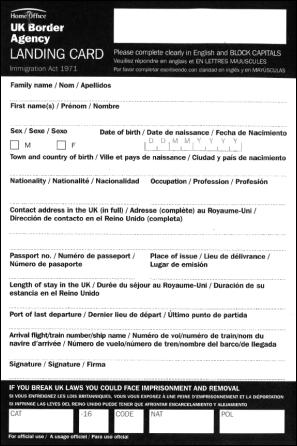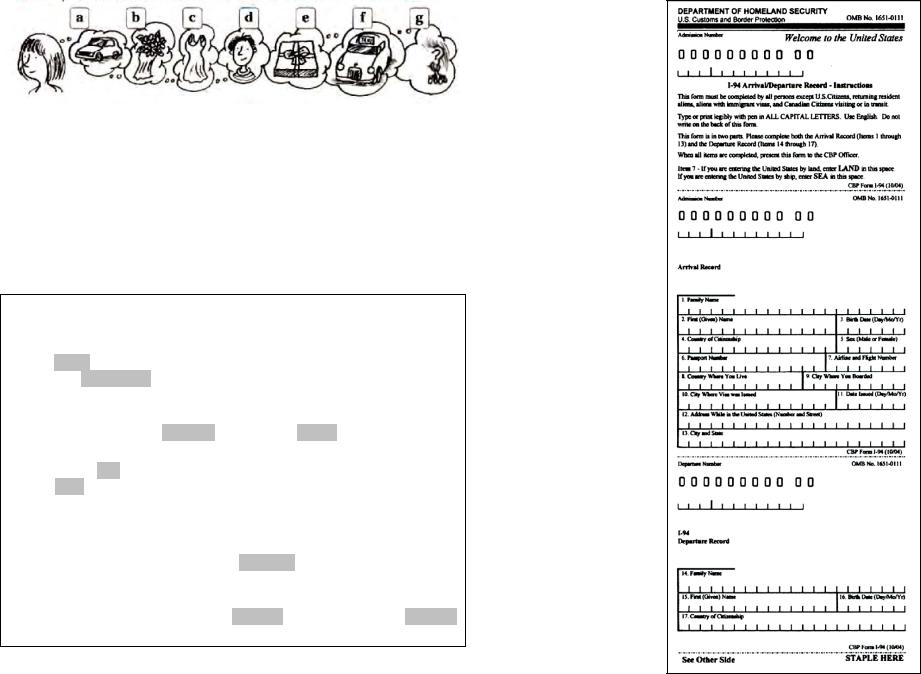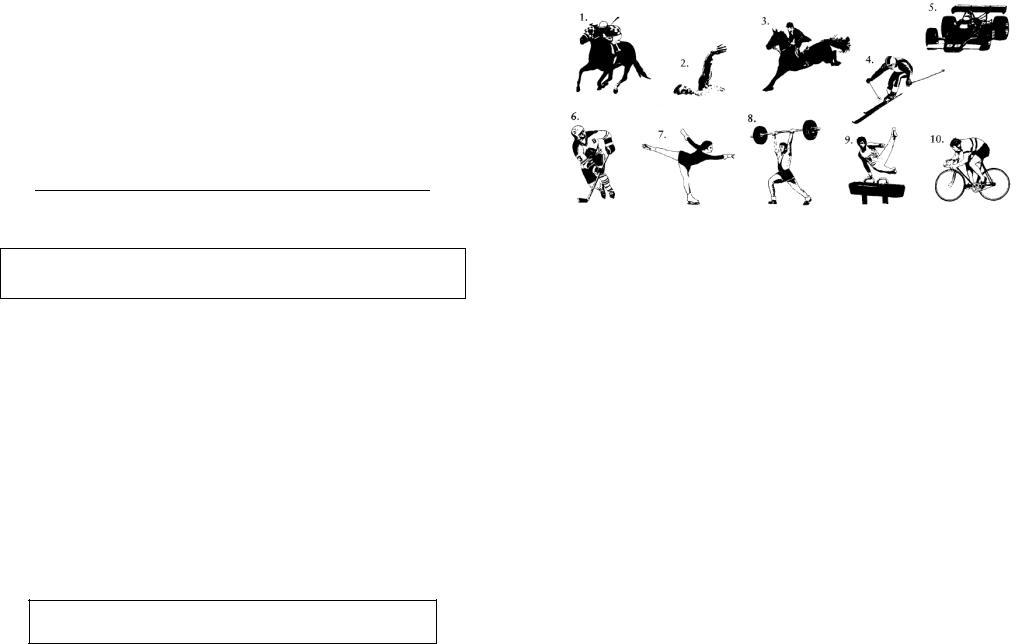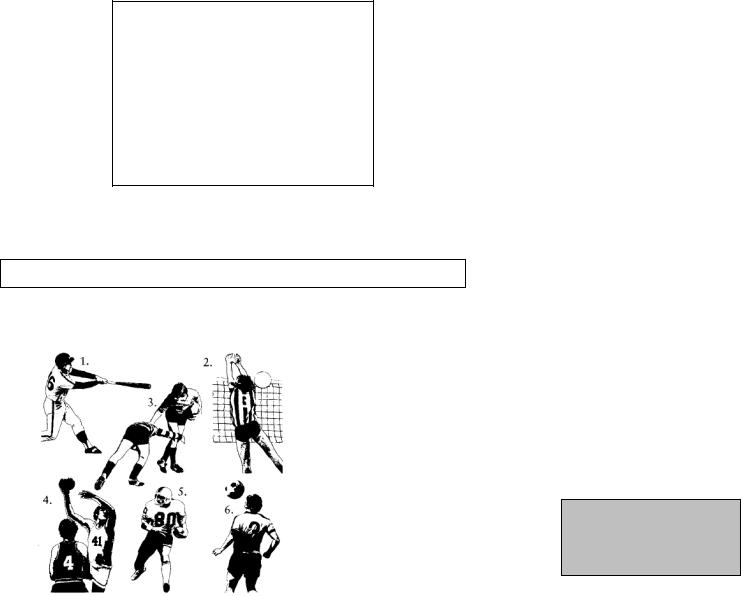
О.В.Борисова Английский язык
.pdf
82
sew [sou] |
sewed [soud] |
sewn [soun] |
Шить |
|
|
|
|
Встряхивать |
|
shake [ eik] |
shook [ uk] |
shaken [' eik(ə)n] |
|
|
|
|
|
Показывать |
|
show [ əu] |
showed [ əud] |
shown [ əun] |
|
|
|
|
|
Закрывать |
|
shut [ t] |
shut [ t] |
shut [ t] |
|
|
|
|
|
Петь |
|
sing [siŋ] |
sang [sæŋ] |
sung [s ŋ] |
|
|
|
|
|
|
|
sink [siŋk] |
sank [sæŋk], sunk |
sunk [s ŋk] |
Тонуть |
|
[s ŋk] |
|
|||
|
|
|
|
|
|
|
|
Сидеть |
|
sit [sit] |
sat [sæt] |
sat [sæt] |
|
|
|
|
|
Спать |
|
sleep [sli:p] |
slept [slept] |
slept [slept] |
|
|
|
|
|
Скользить |
|
slide [slaid] |
slid [slid] |
slid [slid] |
|
|
|
|
|
Говорить |
|
speak [spi:k] |
spoke [spouk] |
spoken ['spouk(e)n] |
|
|
|
|
|
Тратить |
|
spend [spend] |
spent [spent] |
spent [spent] |
|
|
|
|
|
Портить |
|
spoil [sp il] |
spoilt [sp ilt] |
spoilt [sp ilt] |
|
|
|
|
|
Расстилать |
|
spread [spred] |
spread [spred] |
spread [spred] |
|
|
|
|
|
Прыгать |
|
spring [spriŋ] |
sprang [spræŋ] |
sprung [spr ŋ] |
|
|
|
|
|
Стоять |
|
stand [stænd] |
stood [stu:d] |
stood [stu:d] |
|
|
|
|
|
Красть |
|
steal [sti:l] |
stole [stoul] |
stolen ['stəulən] |
|
|
|
|
|
Колоть |
|
stick [stik] |
stuck [st k] |
stuck [st k] |
|
|
|
|
|
Жалить |
|
sting [stiŋ] |
stung [st ŋ] |
stung [st ŋ] |
|
|
|
|
|
Выметать |
|
sweep [swi:p] |
swept [swept] |
swept [swept] |
|
|
|
|
|
Плавать |
|
swim [swim] |
swam [swem] |
swum [sw m] |
|
|
|
|
|
Качать |
|
swing [swiŋ] |
swung [sw ŋ] |
swung [sw ŋ] |
|
|
|
|
|
Брать, взять |
|
take [teik] |
took [tuk] |
taken ['teik(ə)n] |
|
|
|
|
|
Учить |
|
teach [ti:t ] |
taught [t :t] |
taught [t :t] |
|
|
|
|
|
Рвать |
|
tear [t ə] |
tore [t :] |
torn [t :n] |
|
|
|
|
|
Рассказывать |
|
tell [tel] |
told [tould] |
told [tould] |
|
|
|
|
|
Думать |
|
think [θiŋk] |
thought [θ :t] |
thought [θ :t] |
|
|
|
|
|
Бросать |
|
throw [θrəu] |
threw [θru:] |
thrown [θrəun] |
|
|
|
|
|
|
|
understand |
understood |
understood |
Понимать |
|
[ ndə'stænd] |
[ ndə'stud] |
[ ndə'stud] |
|
|
|
|
|||
|
|
|
Просыпаться |
|
wake [weik] |
woke [wouk] |
woken ['wouk(e)n] |
|
|
|
|
|
Носить |
|
wear [w ə] |
wore [w :] |
worn [w :n] |
|
|
|
|
|
Плакать |
|
weep [wi:p] |
wept [wept] |
wept [wept] |
|
|
|
|
|
Мочить |
|
wet [wet] |
wet [wet] |
wet [wet] |
|
|
|
|
|
Выигрывать |
|
win [win] |
won [w n] |
won [w n] |
|
|
|
|
|
Извиваться |
|
wind [waind] |
wound [waund] |
wound [waund] |
|
|
|
|
|
Писать |
|
write [rait] |
wrote [rout] |
written ['ritn] |
|
|
|
|
|
|
|
59
e.I (not see) the match because I (work).
f.When you (call) me, I (talk) to my boss.
g.At six o’clock last night I (drive) home.
h.She (sit) at home when she (see) the news on TV.
4. Grammar and speaking
4.1Complete the dialogue. Listen and check. Repeat and copy the rhythm.
Where ____ you at six o’clock in the evening?
I ____ at work.
What ____ you ____?
I ____ ____ a meeting with the boss.
4.2Work in pairs. In turns, ask and answer questions about yesterday.
a.6 p.m.
b.7 a.m.
c.3.30 p.m.
d.11.30 a.m.
e.8 p.m.
f.between 2 p.m. and 3.30 p.m.
g.between 8 a.m. and 8.30 a.m.
5. Listening and speaking
5.1 You are going to listen to the first part of Katie’s story about her holiday in Amsterdam. Look at the words from her story. What problem do you think they had?
delayed stuck announcement remembered hotel
5.2Listen and answer the questions.
a.Why did they go to Amsterdam?
b.What kind of hotel did they book?
c.What happened when they were on the plane?
d.What happened when they were waiting?
e.What did they want to do but couldn’t?
f.What did they do when they arrived in Amsterdam?
g.What happened when they came to the hotel?
5.3Listen to the second part of the story and complete the sentences.
a.I ____ really tired, and it ____ to rain.
b.We ____ down a street when we ____ a small light.
c.The phone ____ all the time, and they ____ people in all night!
d.We ____ so tired we just ____ until the evening.

60
5.4 Speak about your holiday experience (a real story or an imaginary one). Include the following details:
a.Where did you go?
b.When was it?
c.Who was with you?
d.How did you travel?
e.What happened suddenly?
f.What were you doing at that moment?
g.What did you do next?
h.How were you feeling at that time?
i.How did it all end?
6. Reading
6.1 Last year Mark and Rosa booked their dream holiday in the Caribbean. Read about their holiday experience. Judging by the title, was it positive or negative?
Arrange the paragraphs in the correct order of the events.
Holiday from hell
1. But that was just the beginning! On the plane they told us that the bad weather over the Caribbean was actually a hurricane – Hurricane George – and that we couldn’t fly to San Antonio. We had to go to the capital city
instead, and stay in the hotel there for the night. And they told us we were going to a five star hotel, next to the beach, with a swimming pool, so we were happy at that point.
2.We decided to have a really good holiday – a ‘dream holiday’ in the Caribbean. We saved money for months and months, and booked this holiday in a place called San Antonio. It cost over a thousand pounds each, but we wanted to do something really special so we booked it for two weeks in May, because all the brochures said it was beautiful there in May.
3.The most horrible part was when the hurricane arrived. That was really frightening. We were sitting in our room, while the windows were banging, the trees were crashing outside, and it was pouring with rain. Then they told us that there were no flights to San Antonio, and we had to stay there for another three days with nothing to do and nowhere to go.
4.So when we finally got to San Antonio, we were five days late. There was no hurricane there! The weather had been perfect all that time!
81
grow [grou] |
grew [gru:] |
grown [groun] |
Расти |
|
|
|
|
Вешать |
|
hang [hæŋ] |
hung [h ŋ] |
hung [h ŋ] |
|
|
|
|
|
Иметь |
|
have [hæv] |
had [hæd] |
had [hæd] |
|
|
|
|
|
Слышать |
|
hear [hiə] |
heard [hз:d] |
heard [hз:d] |
|
|
|
|
|
Прятать |
|
hide [haid] |
hid [hid] |
hidden ['hidn] |
|
|
|
|
|
Попадать в цель |
|
hit [hit] |
hit [hit] |
hit [hit] |
|
|
|
|
|
Держать |
|
hold [hould] |
held [held] |
held [held] |
|
|
|
|
|
Ушибить |
|
hurt [hз:t] |
hurt [hз:t] |
hurt [hз:t] |
|
|
|
|
|
Содержать |
|
keep [ki:p] |
kept [kept] |
kept [kept] |
|
|
|
|
|
Знать |
|
know [nou] |
knew [nju:] |
known [noun] |
|
|
|
|
|
Класть |
|
lay [lei] |
laid [leid] |
laid [leid] |
|
|
|
|
|
Вести |
|
lead [li:d] |
led [led] |
led [led] |
|
|
|
|
|
Наклоняться |
|
lean [li:n] |
leant [lent] |
leant [lent] |
|
|
|
|
|
Учить |
|
learn [lз:n] |
learnt [lз:nt] |
learnt [lз:nt] |
|
|
|
|
|
Оставлять |
|
leave [li:v] |
left [left] |
left [left] |
|
|
|
|
|
Занимать |
|
lend [lend] |
lent [lent] |
lent [lent] |
|
|
|
|
|
Позволять |
|
let [let] |
let [let] |
let [let] |
|
|
|
|
|
Лежать |
|
lie [lai] |
lay [lei] |
lain [lein] |
|
|
|
|
|
Освещать |
|
light [lait] |
lit [lit] |
lit [lit] |
|
|
|
|
|
Терять |
|
lose [lu:z] |
lost [l st] |
lost [l st] |
|
|
|
|
|
Производить |
|
make [meik] |
made [meid] |
made [meid] |
|
|
|
|
|
Значить |
|
mean [mi:n] |
meant [ment] |
meant [ment] |
|
|
|
|
|
Встречать |
|
meet [mi:t] |
met [met] |
met [met] |
|
|
|
|
|
|
|
mistake [mis'teik] |
mistook [mis'tuk] |
mistaken |
Ошибаться |
|
[mis'teik(e)n] |
|
|||
|
|
|
|
|
|
|
|
Платить |
|
pay [pei] |
paid [peid] |
paid [peid] |
|
|
|
|
|
Положить |
|
put [put] |
put [put] |
put [put] |
|
|
|
|
|
Выходить |
|
quit [kwit] |
quit [kwit] |
quit [kwit] |
|
|
|
|
|
Читать |
|
read [ri:d] |
read [red] |
read [red] |
|
|
|
|
|
Ездить верхом |
|
ride [raid] |
rode [roud] |
ridden ['ridn] |
|
|
|
|
|
Звенеть |
|
ring [riŋ] |
rang [ræŋ] |
rung [r ŋ] |
|
|
|
|
|
Подниматься |
|
rise [raiz] |
rose [rouz] |
risen ['rizn] |
|
|
|
|
|
Бежать |
|
run [r ŋ] |
ran [ræŋ] |
run [r ŋ] |
|
|
|
|
|
Говорить |
|
say [sei] |
said [sed] |
said [sed] |
|
|
|
|
|
Видеть |
|
see [si:] |
saw [s :] |
seen [si:n] |
|
|
|
|
|
Искать |
|
seek [si:k] |
sought [s :t] |
sought [s :t] |
|
|
|
|
|
Продавать |
|
sell [sel] |
sold [sould] |
sold [sould] |
|
|
|
|
|
Посылать |
|
send [send] |
sent [sent] |
sent [sent] |
|
|
|
|
|
Ставить |
|
set [set] |
set [set] |
set [set] |
|
|
|
|
|
|
|

80
Irregular verbs
VERB
be [bi:]
beat [bi:t]
become [bi:k m]
begin [bi'gin]
blow [blou]
break [breik]
bring [briŋ]
build [bild]
burn [bз:n]
burst [bз:st]
buy [bai]
catch [kæt ]
choose [t u:z]
come [k m]
cost [c st]
cut [k t]
do [du:]
draw [dr :]
dream [dri:m]
drink [driŋk]
drive [draiv]
eat [i:t]
fall [f :l]
feed [fi:d]
feel [fi:l]
fight [fait]
find [faind]
fit [fit]
fly [flai]
forget [fə'get]
forgive [fo'giv]
freeze [fri:z]
get [ get ]
give [giv]
go [gou]
PAST SIMPLE |
PAST PARTICIPLE |
ПЕРЕВОД |
|
|
|
Быть |
|
was [w z], were [wз:] |
been [bi:n] |
||
|
|
Бить |
|
beat [bi:t] |
beaten ['bi:tn] |
||
|
|
Становиться |
|
became [bi:keim] |
become[bi:k m] |
||
|
|
Начинать |
|
began [bi'gæn] |
begun [bi'g n] |
||
|
|
Дуть |
|
blew [blu:] |
blown [bloun] |
||
|
|
Ломать |
|
broke [brouk] |
broken ['brouk(e)n] |
||
|
|
Приносить |
|
brought [br :t] |
brought [br :t] |
||
|
|
Строить |
|
built [bilt] |
built [bilt] |
||
|
|
Гореть |
|
burnt [bз:nt] |
burnt [bз:nt] |
||
|
|
Разразиться |
|
burst [bз:st] |
burst [bз:st] |
||
|
|
Покупать |
|
bought [b :t] |
bought [b :t] |
||
|
|
Ловить, хватать, |
|
caught [k :t] |
caught [k :t] |
||
успеть |
|||
|
|
||
|
|
Выбирать |
|
chose [ əuz] |
chosen [t əuz(ə)n] |
||
|
|
Приходить |
|
came [keim] |
come [k m] |
||
|
|
Стоить |
|
cost [c st] |
cost [c st] |
||
|
|
Резать |
|
cut [k t] |
cut [k t] |
||
|
|
Делать |
|
did [did] |
done [d n] |
||
|
|
Рисовать, тащить |
|
drew [dru:] |
drawn [dr :n] |
||
|
|
Мечтать, дремать |
|
dreamt [dremt] |
dreamt [dremt] |
||
|
|
Пить |
|
drank [dræŋk] |
drunk [dr ŋk] |
||
|
|
Водить |
|
drove [drouv] |
driven ['drivn] |
||
|
|
Есть |
|
ate [et] |
eaten ['i:tn] |
||
|
|
Падать |
|
fell [fel] |
fallen ['f :lən] |
||
|
|
Кормить |
|
fed [fed] |
fed [fed] |
||
|
|
Чувствовать |
|
felt [felt] |
felt [felt] |
||
|
|
Бороться |
|
fought [f :t] |
fought [f :t] |
||
|
|
Находить |
|
found [faund] |
found [faund] |
||
|
|
Подходить по |
|
fit [fit] |
fit [fit] |
||
размеру |
|||
|
|
||
|
|
Летать |
|
flew [flu:] |
flown [floun] |
||
|
|
Забывать |
|
forgot [fə'g t] |
forgotten [fə'g t(ə)n] |
||
|
|
Прощать |
|
forgave [fo'geiv] |
forgiven [fo'givn] |
||
|
|
Замерзать |
|
froze [frouz] |
frozen ['frouzn] |
||
|
|
Получать |
|
got [g t] |
got [g t] |
||
|
|
Давать |
|
gave [geiv] |
given [givn] |
||
|
|
Идти |
|
went [went] |
gone [g n] |
61
5.We arrived at the hotel, the Hotel Paradiso it was called, what a joke! They said it was a five star hotel, but I wouldn’t give it one star! It was just awful. Yes, it was next to the sea, but there wasn’t a beach, just a few rocks, and the sea was so dirty. There were big ships travelling past, and the sea was all polluted and brown. It looked horrible.
6.So we went to look at the swimming pool, but that was no better. It was a sort of greeny black colour, and as we looked we saw things that were moving in it. We looked closer and we realized it was full of frogs! There were hundreds of frogs in it!
7.We were flying from Gatwick airport, and the flight was overnight, leaving Gatwick late at night and arriving at San Antonio the next morning. But when we arrived at the airport they told us that because of the bad weather in the Caribbean, the flight was delayed until the next morning. So we had to spend the night at the airport, sleeping on the floor, and we finally got on the plane the next morning twelve hours late.
6.2Can you guess the meaning of the highlighted words from the context?
7. Conversation patterns
7.1Allie is going to the United States. Listen to the conversation at the airport immigration control. Why is she in the US? How long is she planning to stay in the country?
7.2Match the officer’s questions and Allie’s answers.
Officer |
Allie |
Good evening, madam. |
From London. |
How long are you staying in the US? |
In San Francisco, at the Pacific View Hotel. |
Is he family or a friend? |
A week. |
Where are you staying? |
Yes, Mark Ryder. |
What’s the purpose of your visit? |
Good evening. |
Enjoy your stay in San Francisco. |
He’s a colleague – and a friend. |
Where are you arriving from? |
Yes, it is. |
Do you know anybody here? |
Business. I’m here for a conference. |
Is this your first visit to the US? |
Thank you. |
|
|

62
7.3In pairs, roleplay the dialogue. Swap roles.
7.4In pairs, act out a dialogue at immigration.
a.You are going to the UK for a month to study English at the language school called Edwards English School in London. You are going to live in their hall of residence.
b.You are going to spend three months in the USA. You are taking part in the program Work and Travel USA. You are going to stay in the hostel called Tropics in Miami.
8. Writing
Arriving in Britain, you have to fill in a UK landing card. In the USA, there is a special Arival/Departure Record. Look at the samples and say what information you have to write about. Practise filling in both cards.
79
5.2 Guess the meaning of the highlighted words from the context.
6. Speaking
6.1 How different is your lifestyle from the Okinawan lifestyle? Make a list of differencies.
e.g. People on Okinawa eat seven portions of fruit every day. I eat fruit one or two times day.
6.2 Your friend has decided to start a new healthy life. Help him/her develop a plan. Use the information from 5.1.
e.g. You know, people on Okinawa never feel stressed. I think you shouldn’t be so stressed.
7. Writing
In groups. You are TV editors preparing questions for a popular TV program where people answer the host’s questions and earn money for that. Choose a topic and make a quiz (10-15 questions) for a program. Don’t forget to provide correct answers!
1.Sports and sportsmen
2.History of sport
3.Team sports
4.Unusual sports
OVER TO YOU:
1.Can you describe your favourite game?
2.Can you speak about a healthy way of life?
3.Can you speak about your attitude to sport?

78 |
63 |
e.g. Shall I go by car?
4.3 Work in pairs. Help Liza make a decision. Act out a conversation. e.g. Liza: Shall I go by car?
You: I think you should walk. It’s not very far.
5. Reading
5.1 According to the statistics, people on the island of Okinawa in Japan live longest lives in the world. Read the article and list the reasons why.
How not to die before you get old
Chiako is active and healthy. She gets up at 7 a.m. every day, takes a 30 minute walk and plays a ball game with her friends three times a week. There is nothing unusual about it except Chiako is 102 years old. She is not alone – there are hundreds of other healthy centenarians on Okinawa who have the same lifestyle.
Okinawa is a group of islands between Japan and Taiwan. Near a beach, there is a large stone with the following words on it: At 70 you are still a child, at 80 you are just a youth, and at 90, if the ancestors invite you into heaven, ask them to wait until you are 100, and then you can start thinking of it.
Okinawans stay slim in old age by eating a low calorie diet which consists of three quarters plant food and one quarter animal food. They eat seven portions of fruit and vegetables every day and they stop eating when they are still hungry.
They also keep active by dancing, walking and gardening. In other words, they do the things they enjoy.
Okinawans never feel stressed. Nobody is in a hurry, there are no timetables, and there is always tomorrow. Hundreds of people, both young and old, go to the beach every day to watch sunsets. In Okinawa there is always time to watch a sunset.
Okinawans have large families and strong networks of friends. There is no magic pill.
If you have good friends, a healthy diet and a stress free lifestyle, you’ll live longer.

64
OVER TO YOU:
1.Can you describe the best holiday in your life?
2.Can you describe an interesting / unusual event from your past?
3.Can you describe your ideal holiday?
77
a.You won’t pass.
b.He won’t pay you back.
c.You won’t find a parking space.
d.You’ll miss it.
e.They’ll be late.
f.It’ll rain.
g.You won’t understand a word.
h.It won’t last.
i.You’ll break your leg.
3.3Predict the future in these situations. Use WILL / WON’T.
e.g. I usually eat low-calorie food. – You’ll stay fit.
a.She eats late in the evening.
b.He isn’t getting ready for his exam.
c.He smokes two packs a day.
d.They are practising hard before the game.
e.There is a lot of ice and snow on the roads.
4. Conversation patterns
4.1 Look at the pictures. What are the people saying? Listen and check.
a.………
b.………
c.………
Listen again and repeat the phrases. Copy the rhythm.
4.2 Your friend Liza is going to a party. Look at the pictures and write down her thoughts.

76
Do you like sport?
What sports do you play?
Have you ever won a cup or a trophy?
Have you ever had a sport trauma?
Do you prefer doing sport or being a spectator?
Do you go to watch a local sports team?
Are there any good sports facilities in this town?
What sport would you like to learn to play well?
What sports did you have to do at school?
Did you enjoy it?
How often do you do sport in your free time?
Do you think you are fit?
Do your family members like sport?
Do you watch any sports together?
Do you play any sports together?
Have you ever been to a big sportive event?
3. Grammar
3.1 What is wrong with James? How is he feeling? What do you think he says to his friend Daniel? Choose the correct answer, listen and
check.
Daniel: My team are playing in the cup tonight. James: a. They’ll win.
b. They’ll lose. c. Not interested.
3.2 Listen to the phrases and repeat. These are James’s answers to other people. What do you think they told James? Write their phrases. Then listen and check.
65
Module 8
IT’S A SMALL WORLD
Who do you think these myths are about? Do you think these myths are true?
They drink tea every day at five o’clock.
They enjoy bullfighting.
They are very keen on fast food.
They eat pasta every day.
They keep bears as pets.
1. Pronunciation and vocabulary
Practise saying the names of the countries. Complete the chart with nationalities and languages. Listen and check.
|
Country |
Nationality |
Language |
|
|
|
|
|
The United |
The British |
English |
|
Kingdom |
|
|
|
|
|
|
|
Spain |
|
|
|
|
|
|
|
Japan |
|
|
|
|
|
|
|
Brazil |
|
|
|
|
|
|
|
Italy |
|
|
|
|
|
|
2. Reading and vocabulary |
|
|
|
2.1 Read the article. What does it say about national stereotypes?
Are we typical?
The English are cold and reserved, Brazilians are lively and fun loving, and the Japanese are shy and hardworking – this is what people usually think about these nationalities.
How much truth is there in national stereotypes? Two scientists, Robert McCrae and Antonio Terraciano, investigated the subject, and the result was surprising.

66
The scientists tested people of 49 different nationalities. Then, they interviewed them and asked them to describe a typical member of their society. The analysis showed that the stereotype was very different from the reality.
For example, Italians and Russians think of themselves as sociable and open, but the tests show they are more reserved. The Spanish see themselves lazy, but in fact they are very hardworking. The English are the most open minded nationality, which is very far from the stereotype!
The tests also showed that all nationalities don’t have many differences. In fact, we have a lot in common!
2.2In the text, find the words describing character.
2.3Complete the sentences with the personality adjectives.
hardworking open minded lazy reserved sociable hospitable shy fun loving practical reliable talkative organized moody
a.______ people who are open and enjoy the company of other people
b.______ people who are happy one minute and sad the next minute
c.______ people who like chatting
d.______ people who like to work
e.______ people who don’t like to show their feelings
f.______ people who can be self-disciplined
g.______ people who don’t like to work
h.______ people who like visitors
i.______ people who are not confident in themselves
j.______ people who know how to spend their money
k.______ people you can trust or believe
l.______ people who love parties
m.______ people who are open to new ideas
2.4 What kind of person are you? Describe yourself in three words. Are you a typical representative of your nationality?
3. Speaking and vocabulary
3.1 Match the geographical words from the box with their definitions. Listen and repeat.
island population scenery climate beach mountain volcano
desert glacier border river lake taiga coastline canal
75
2.2 What sports can you see in these pictures? Check with a dictionary.
a. |
h____ r____ |
f. |
i____ h____ |
b. |
s____ |
g. |
i____ s____ |
c. |
s____ j____ |
h. |
w____ |
d. |
s____ |
i. |
g____ |
e. |
m____ r____ |
j. |
c____ |
2.3 PLAY / DO / GO
We usually play team sports, do martial arts (judo or karate), and use go with all other sports.
a.What sports do you do?
b.What sports have you done?
c.What sports do you prefer watching?
d.What sports don’t you want to do and why?
2.4Interview your partner using the questionnaire. Write down his/her answers.
2.5In groups of five or six. Compare your answers and find out…
a.the most popular sport in your group
b.the most unpopular sport
c.the most sport-minded person
d.the most sport-minded family
e.the sport most people want to try
f.who has had most traumas
g.who has most trophies
h.the best sport facilities in this town

74
Module 9
FIT FOR FUN
Do the quiz with a partner. Ask and answer the questions.
How energetic are you?
…get up as soon as you wake up?
…slow getting ready in the morning?
… walk or go by bus? How often … run upstairs?
…often sleepy after lunch?
…active or tired in the evening? How often … stay up late or all night?
1. Pronunciation
Write the words in two columns according to the vowels in them. Listen and check.
ball serve caught world draw fought hurt score sport shirt warm worse
2. Vocabulary and speaking
2.1Match the pictures and the sports. Pronounce the words.
a.football (soccer)
b.basketball
c.American football
d.rugby
e.baseball
f.volleyball
67
a. an area of water surrounded by land
b. a very dry place where there is very little rain c. the dividing line between countries
d. an area of land surrounded by water e. all the people living in a country
f. the type of weather characteristic for a particular area g. a man-made river
h. a stream of water flowing into another stream or a sea i. a view, natural features of an area
j. the line where sea and land meet
k. the type of forest where conifer trees mostly grow l. a large mass of ice
m. a large landform usually higher than the surrounding areas
n. an opening in the planet’s crust which allows magma go to the surface o. a part of a coastline where you can go sunbathing
3.2 |
What do you know about New Zealand? Can you answer the questions? |
||
|
a. Which is the nearest country: Australia or the Philippines? |
||
|
b. How many islands are there? |
|
|
|
c. |
Which country is as big as New Zealand? |
|
|
d. |
How large is the population? |
|
|
e. |
What are the two official languages? |
|
|
f. |
What film made New Zealand popular for tourists? |
|
|
g. Which part of New Zealand has a colder climate? |
||
|
h. What kind of scenery can you find there? |
||
3.3 |
Listen and check. Which words from 3.1 can you hear? Listen again and check. |
||
3.4 |
Speak about New Zealand. Use the phrases from the box. |
||
|
|
||
It’s in the south / north / east / west of… |
It’s the highest / biggest / nearest … |
||
It’s famous for … It’s a good place for… |
People think that… It has fantastic… |
||
|
|
||
3.5 |
How well do you know your country? Make questions, then listen, check and |
||
repeat. Answer the questions.
Climate
What’s / cold / place?
What’s / hot / place?

68
Tourism
What’s / beautiful / city?
What’s /popular place for tourists? Why? What’s / good / time of the year to visit? What’s / bad / time to visit? Why?
What’s / good / way to travel round the country?
What’s / dangerous / region? Why?
4. Grammar
Geography
What’s / high / mountain?
What’s / long / river?
What’s / big / city?
4.1 Complete the chart with the forms of adjectives.
adjective |
comparative |
superlative |
|
|
|
cold |
colder |
coldest |
|
|
|
high |
|
|
|
|
|
hot |
hotter |
|
|
|
|
dangerous |
|
|
|
|
|
dry |
|
driest |
|
|
|
windy |
|
|
|
|
|
good |
better |
|
|
|
|
bad |
|
worst |
|
|
|
4.2Complete the sentences with a form of an adjective.
a.Driving is (dangerous) than flying.
b.This is the (famous) building in the city.
c.Chinese is one of the (difficult) languages to learn.
d.Canada is (big) than Brazil.
e.This is the (populated) region of the country.
f.French wine is (good) than English wine.
g.It’s the (hot) place in the world.
h.Buses are (cheap) than trains.
73
In pairs. You are a travel agency and you are making a promotional website for your new tour around Russia. Choose an object from this project and write a presentation about it.
Include the following information for foreign tourists:
a.Where is it?
b.What is the best way to get there?
c.What is interesting about it?
d.What is the history of this place?
e.Are there any limitations or safety precautions?
OVER TO YOU:
1.Can you describe a country you have visited / want to visit?
2.Can you describe traditions and celebrations in some country?
3.Can you describe the region you live in?
